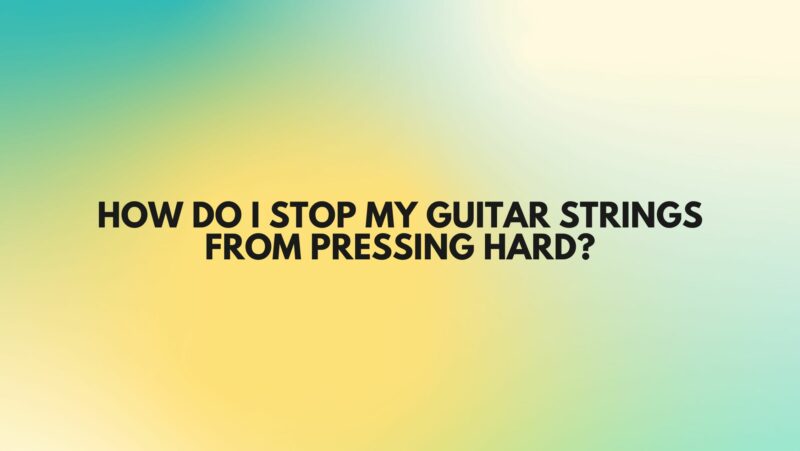If you’ve ever found yourself struggling with pressing too hard on your guitar strings, you’re not alone. Achieving the right balance of finger pressure is a common challenge for guitarists, especially beginners. Pressing too hard can result in various issues, including sore fingers, buzzing strings, and even intonation problems. In this comprehensive article, we will explore effective techniques and strategies to help you stop pressing too hard on your guitar strings, allowing you to play more comfortably and produce cleaner, better-sounding music.
- Understanding the Problem
Before addressing the issue, it’s important to understand why you might be pressing too hard on the guitar strings:
a. Inexperience: Beginners often exert excessive pressure due to a lack of familiarity with the instrument and the required touch.
b. Fear of Buzzing: Buzzing strings can be bothersome, so some players press harder in an attempt to avoid this issue.
c. Overcompensation: If you’ve encountered problems with muted or buzzing notes in the past, you might be overcompensating by pressing too hard to ensure clear sound.
- Develop Finger Strength and Control
One of the most effective ways to stop pressing too hard is to build finger strength and control. Practice finger exercises and scales regularly to improve your finger dexterity and independence. Stronger fingers will allow you to fret the strings with less effort, reducing the tendency to press too hard.
- Use the Correct Finger Placement
Proper finger placement is essential for reducing excessive pressure. Instead of pressing with the pad of your fingers, use the fingertips. This ensures that you’re applying pressure directly on the string and the fretboard, requiring less force for clear notes.
- Position Your Hand Correctly
The position of your hand on the guitar neck is crucial. Keep your thumb positioned behind the neck, opposite your fingers. This provides better leverage and control. Avoid gripping the neck too tightly, as it can lead to over-pressing.
- Practice Light Touch Exercises
Devote time to practicing exercises that specifically focus on a light touch. Play scales and simple melodies, focusing on maintaining a gentle, controlled finger pressure. Start slowly and gradually increase your speed as you become more comfortable with a lighter touch.
- Listen and Adjust
Train your ears to detect when you’re pressing too hard. If you hear buzzing or muted notes, it’s a sign that you’re applying too much pressure. Be attentive to your playing and make adjustments accordingly.
- Use Proper Guitar Setup
A well-set-up guitar can make a significant difference in your playing comfort. Consider consulting a professional luthier or guitar technician to ensure your guitar’s action (string height) and neck relief are properly adjusted. An instrument that is set up correctly will require less pressure to produce clear notes.
- Relaxation and Breath Control
Tension in your body can lead to excessive finger pressure. Practice relaxation techniques and deep breathing exercises to release tension in your hands and fingers. Relaxed hands are more agile and responsive, allowing for a lighter touch.
- Patience and Persistence
Breaking the habit of pressing too hard can take time. Be patient with yourself and persistent in your practice. Gradually, your muscle memory will adapt to the lighter touch, and it will become second nature.
Conclusion
Learning to stop pressing too hard on your guitar strings is a valuable skill that can significantly improve your playing experience. By developing finger strength, practicing proper finger and hand positioning, and focusing on a lighter touch, you can achieve a balanced and controlled technique. Remember that it’s a journey of improvement, so don’t be discouraged by initial challenges. With dedication and practice, you’ll find that your playing becomes more comfortable, more expressive, and produces cleaner, better-sounding music.


